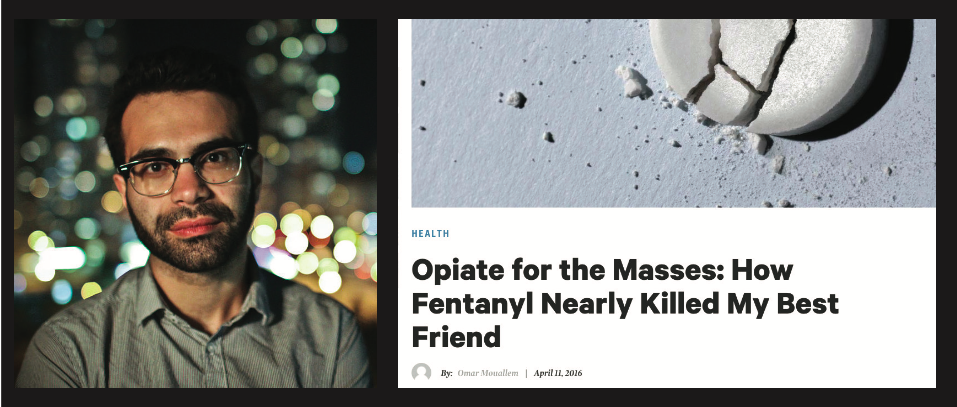The longform magazine writer leads the pack at this year’s National Magazine Awards, with four writing nominations.
This story was funded by the J-Source Patreon campaign
By Jane Gerster
Where journalists scramble to be first on the scene, Omar Mouallem hangs back.
Case in point: after the Fort McMurray forest fire spread rapidly last spring, destroying homes and forcing the province’s largest ever evacuation, many Alberta journalists almost immediately made the trek north to report. Not Mouallem. His first trip was late in the summer.
“I joked that I was literally the last Alberta reporter or journalist to go to Fort McMurray,” he said.
And yet, the supposedly last Alberta reporter is now co-author of Inside the Inferno, fire captain Damian Asher’s memoir about battling the blaze.
“I’m always amazed by how much I’m able to discover in the stories,” Mouallem said, “because I’m rarely the first person to it.”
Even those unfamiliar with Mouallem’s written work may have heard his voice these last few weeks as Canadaland’s guest host. But while Mouallem’s episodes — particularly “It was Illegal To Print Their Names: Alberta’s Lost Children” with Paula Simons — have earned him considerable praise, long form is where he excels. Mouallem leads the pack at this year’s National Magazine Awards with four writing nominations — two for feature writing, one for profiles, and one in the “One of a Kind” category.
As a freelance journalist, his stories cover a broad range of issues — “Opiate for the Masses” is about fentanyl’s rise and a friend’s near overdose; “Welcoming Omar Khadr” is a re-telling of sorts of a Christian university’s intense advocacy for Guantamo’s youngest inmate; “The Fight of his Life” is a reflective piece about a retired wrestler’s fight against sickness and injury; and “Miss Cat-geniality” is an unexpectedly genuine opus about cat pageants and feline psychology — but Mouallem adopts a similar structure for most.
“Almost all of them start about halfway through the story and then I go back in time to show how the subject go there,” he said, “In the third act, we move towards a resolution: what is the future of this person going to look like?”
Act I, Act II, and Act III. Mouallem’s structural style is directly linked to his time spent studying film and screenwriting. “My education in storytelling is about conflict and tension, tension and release, having complex, interesting characters and telling stories in a sort of three-act way,” he said.
Longform affords him the “opportunity to tell stories with full arcs,” while also helping provide much-needed context in a world increasingly driven by 140-character bursts of thought.
“So much of our news is reactionary,” Mouallem said. “I think we need a little bit more that is reflective.”
To get that, he said, you need time. Mouallem’s interviews usually last an hour, often two. He speaks with people “after the dust has settled,” when they’ve had time to think about what’s happened, to process how they’re feeling.
“It’s a lot about how they felt at a certain moment or how they feel now, how the world looks to them,” Mouallem said. ”
There is a paragraph in “Opiate for the Masses” where the value of that reflection becomes intensely clear. Mouallem is seeing his friend — a recovered addict — about six months after he nearly overdosed at Mouallem’s home.
“I’m still not over his utter disrespect for our home and lives,” he writes. “That entire visit — the happy greetings and hugs — all a pretence to shoot up and leave me and my wife with the consequences. Then I remind myself: it’s also the only reason he’s alive today.”
You’ll notice Mouallem in all his stories, either as a physical character on the page or through decisive narrative moments. He doesn’t try to shrink out of view and he doesn’t write a story unless he has a thesis.
“I rarely believe that journalists are truly objective… most of them have an agenda,” Mouallem said. He said it was journalist and author Curtis Gillespie who taught him “that it was okay to put yourself in the story.”
In some ways, he said, it’s just a journalist being more transparent. After all, think about when you write a pitch, think about that requisite line where you have to explain why you are the person who should tell this story.
“Sometimes the answer is simple: you thought of it first, you did a lot of research,” Mouallem said, “but often times you have a connection to it and if that connection is a person, if it moves the story along more forcefully and convincingly, then I say go for it.”
Editor’s note, May 24, 2017, 10:06 a.m.: An original version of this story stated that Mouallem saw his friend a few years after an overdose. It was actually about six months. We apologize for the error.

